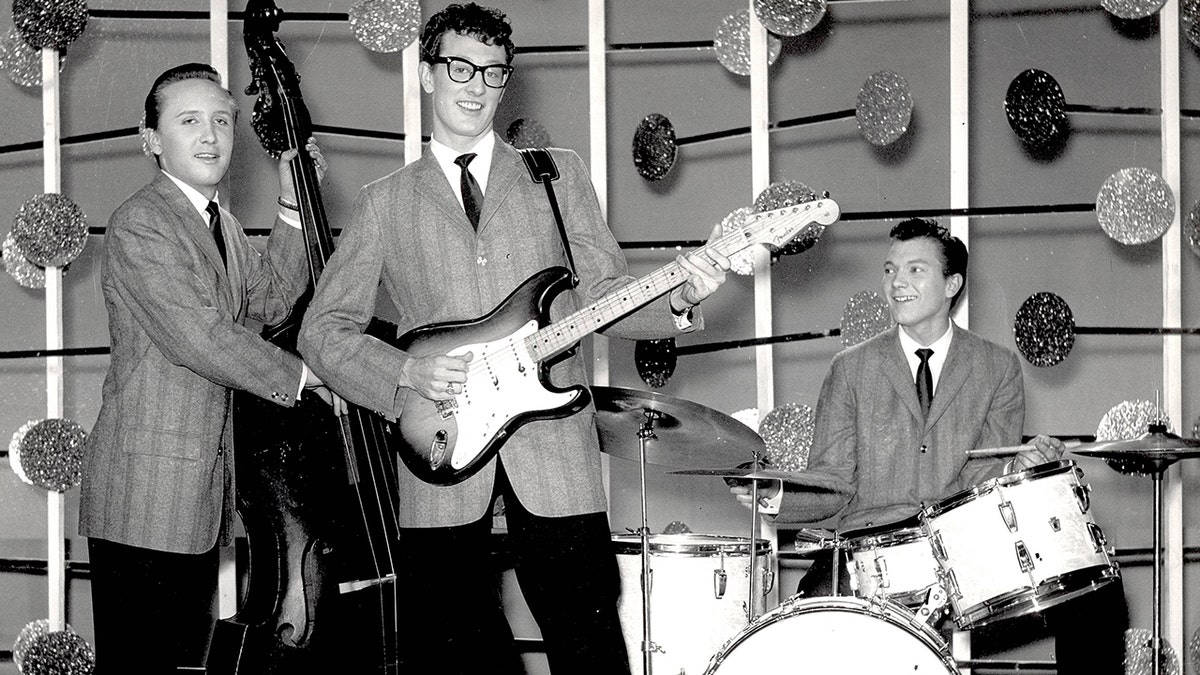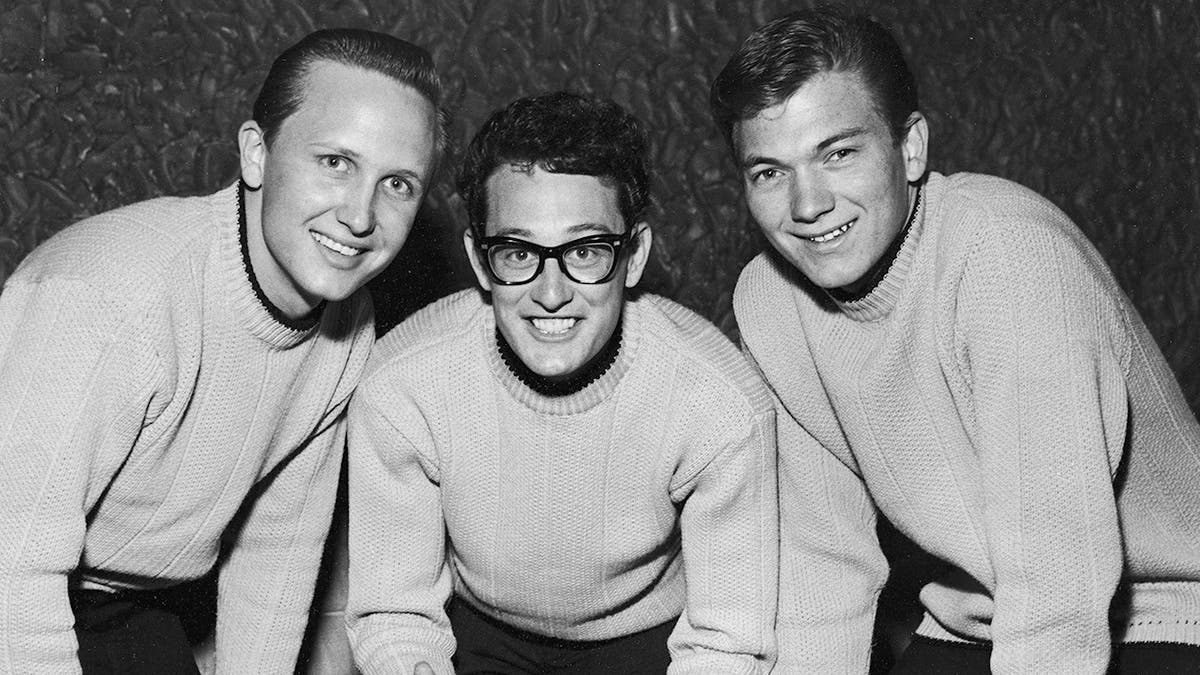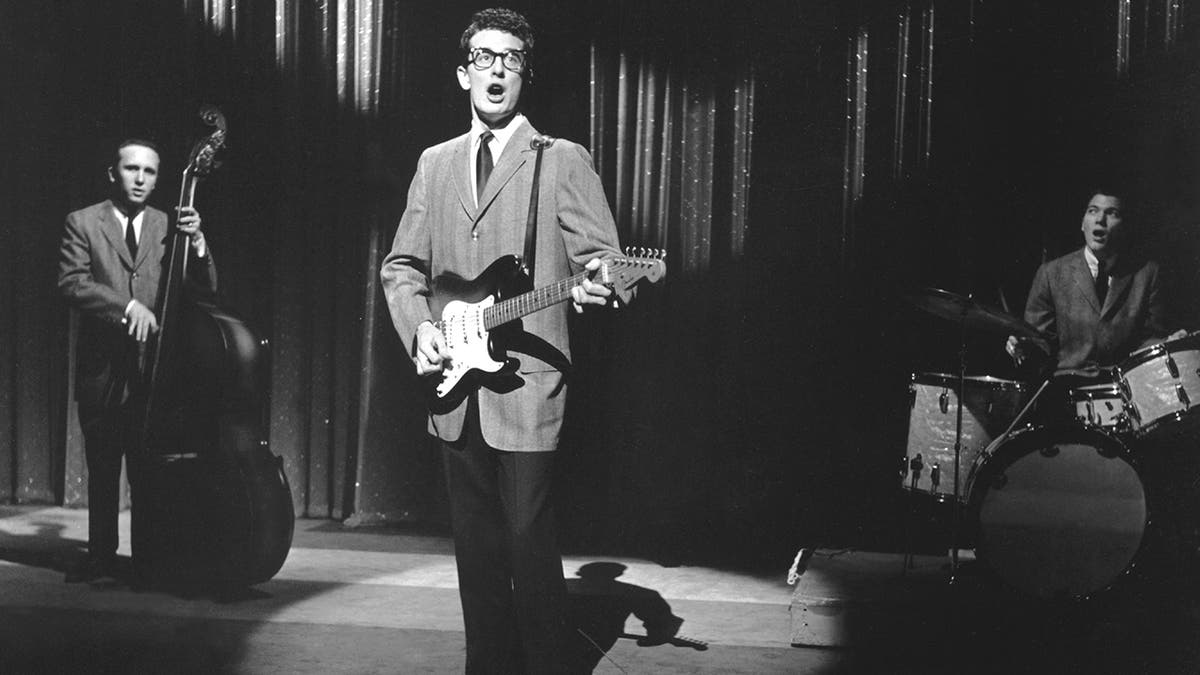Legendary American singer and songwriter Charles Hardin Holley — known to the world as Buddy Holly — was born on this day in history, Sept. 7, 1936, in Lubbock, Texas.
The spelling change from Holley to Holly came about because of an error in a contract he was asked to sign, listing him as Buddy Holly, according to the website for "The Buddy Holly Story."
As the fourth and youngest child in his family, Holly was nicknamed "Buddy" by his mother, who felt that his given name was too big for her young boy, according to Biography.com.
As a youngster, Holly learned to play piano and fiddle, while his older brothers taught him the basics of guitar.
His parents were supportive of their son's emerging musical talents, the same source indicated.
The African American rhythm and blues that he heard on the radio influenced him, according to Britannica.com.

Buddy Holly and the Crickets (from left to right), Joe B. Mauldin, Buddy Holly (with Fender Stratocaster guitar) and Jerry Allison, pose for a group shot on the set of the BBC television show "Off The Record" during their U.K. tour in March 1958. (John Rodgers/Redferns)
"Already well versed in country music, bluegrass and gospel and a seasoned performer by age 16, he became a rhythm-and-blues devotee. By 1955, after hearing Elvis Presley, Holly was a full-time rock and roller," the same source chronicled.
The influence of Elvis made a huge impact on Holly, who was taken with the charisma and energetic, exciting sound of Elvis, said the New World Encyclopedia.
Late that year, Holly purchased a Fender Stratocaster electric guitar and developed a style of playing featuring ringing major chords that became his trademark, which is most recognizable in the solo break in the tune "Peggy Sue," said Britannica.com.
Elvis Presley made a huge impact on Buddy Holly.
Holly’s big break came when the band opened for Bill Haley and his Comets at a rock and roll show in Lubbock, Texas.
As a result of this performance, Holly was offered a contract with Decca Records to work alone.
However, early success as a solo artist eluded him, according to New Work Encyclopedia.
It’s been reported that Holly's public name changed from "Holley" to "Holly" on Feb. 8, 1956 when he signed the Decca contract, the same source indicated.

Jerry Allison (far right), drummer for Buddy Holly (center) and the Crickets, died at age 82 in August 2022. Joe B. Mauldin (1940–2015) is at far left. (Harry Hammond/V&A Images/Getty Images)
Holly formed his own band, the Crickets, and began making records at Norman Petty’s studios in Clovis, New Mexico.
Among the songs they recorded was "That'll Be The Day."
After the release of several highly successful songs, in March 1958, he and the Crickets toured the United Kingdom, according the website for "The Buddy Holly Story."
Holly wed Maria Elena Santiago on Aug. 15, 1958 — and in 1959, Holly split with the Crickets and began a solo tour with other notable performers including Ritchie Valens and J.P. Richardson, the same source said.
On Feb. 3, 1959, Buddy Holly, along with J.P. "The Big Bopper" Richardson and Ritchie Valens, died in a tragic plane crash.
Following the Feb. 2, 1959 performance at the Surf Ballroom in Clear Lake, Iowa, after mechanical difficulties with a tour bus, Holly chartered a plane for his band to fly between stops on the Winter Dance Party Tour, according to History.com.
MEET THE AMERICAN WHO INVENTED THE ELECTRIC GUITAR AND INSPIRED ROCK ‘N’ ROLL
However, Richardson, who had the flu, convinced Holly’s band member Waylon Jennings to give up his seat, and Ritchie Valens won a coin toss for another seat on the plane, the same source recounted.
ON THIS DAY IN HISTORY, MAY 7, 1977, THE SONG ‘HOTEL CALIFORNIA’ BY THE EAGLES HITS NO. 1
On Feb. 3, 1959, Buddy Holly, along with J.P. "The Big Bopper" Richardson and Ritchie Valens, died in a tragic plane crash.
The crash happened a few minutes after takeoff from Mason City on a flight headed for Moorhead, Minnesota.

Photo of Buddy Holly and the Crickets, circa 1958. Singer Don McLean forever memorialized Holly, Valens and Richardson in the 1972 No. 1 hit "American Pie," which refers to Feb. 3, 1959 as "the day the music died." (Steve Oroz/Michael Ochs Archives/Getty Images)
Investigators blamed the crash on bad weather and pilot error, according to multiple sources.
Holly was only 22 years old when he died.
Holly’s headstone carries the correct spelling of his name, Buddy Holley, History.com reported. It also features a carving of his favorite guitar.
The Buddy Holly Hall of Performing Arts and Sciences opened in Lubbock in January 2021.
Singer Don McLean forever memorialized Holly, Valens and Richardson in the 1972 No. 1 hit "American Pie," which refers to Feb. 3, 1959 as "the day the music died."
Holly’s talents continued to be noted even after his untimely death.
For more Lifestyle articles, visit www.foxnews.com/lifestyle
"Unissued recordings and compilations of Holly's work were released in a steady stream throughout the 1960s. Due to the continued popularity of his music and film adaptations of his life's story, Holly's horn-rimmed glasses are easily recognizable today," said Biography.com.
His hometown of Lubbock Texas, also paid tribute to him.
CLICK HERE TO SIGN UP FOR OUR LIFESTYLE NEWSLETTER
Downtown Lubbock has a "Walk of Fame" with plaques to various area artists such as Mac Davis and Waylon Jennings, with a life-size statue of a guitar playing Buddy Holly as its centerpiece.
CLICK HERE TO GET THE FOX NEWS APP
Also, the Buddy Holly Hall of Performing Arts and Sciences opened in Lubbock in January 2021.










































